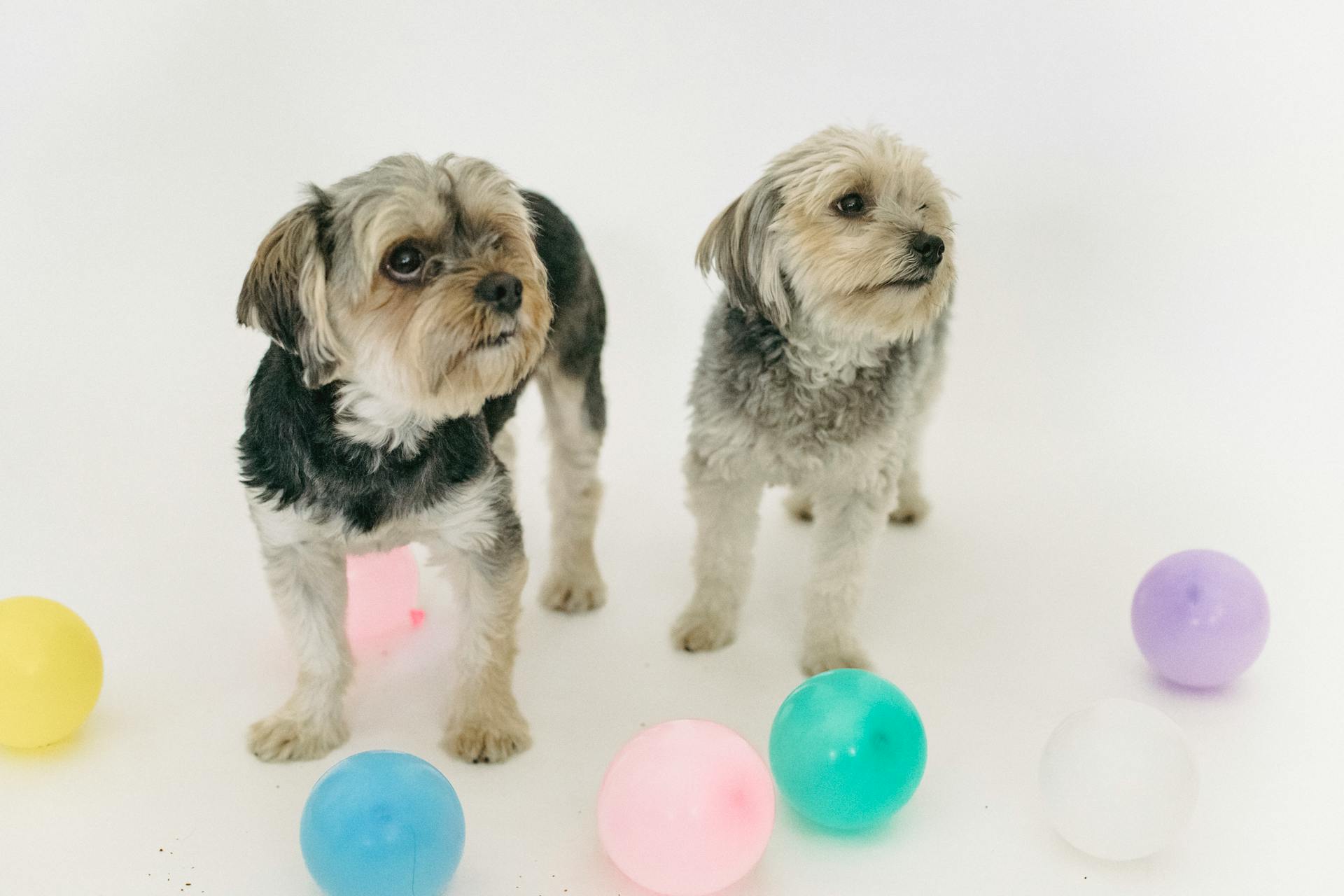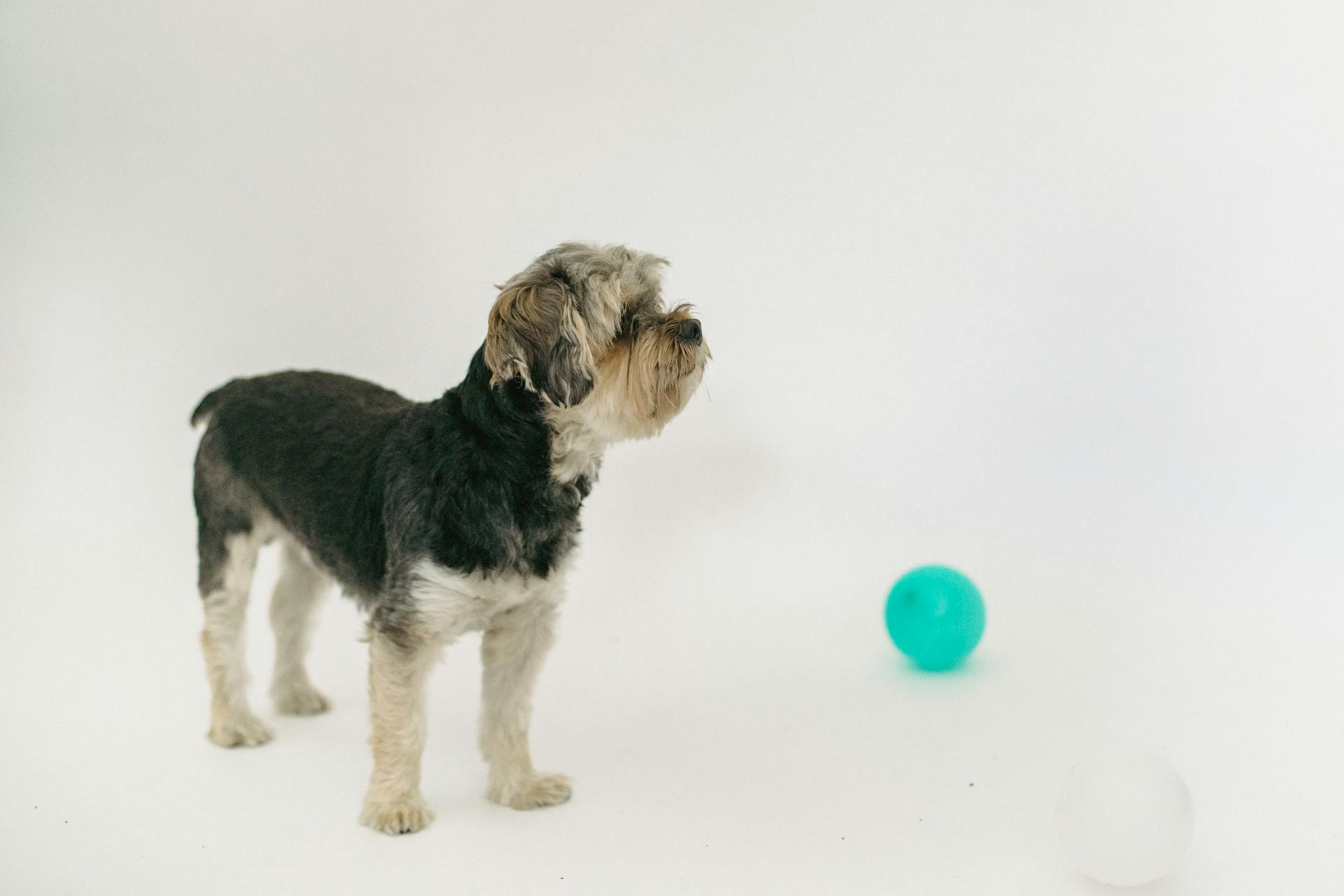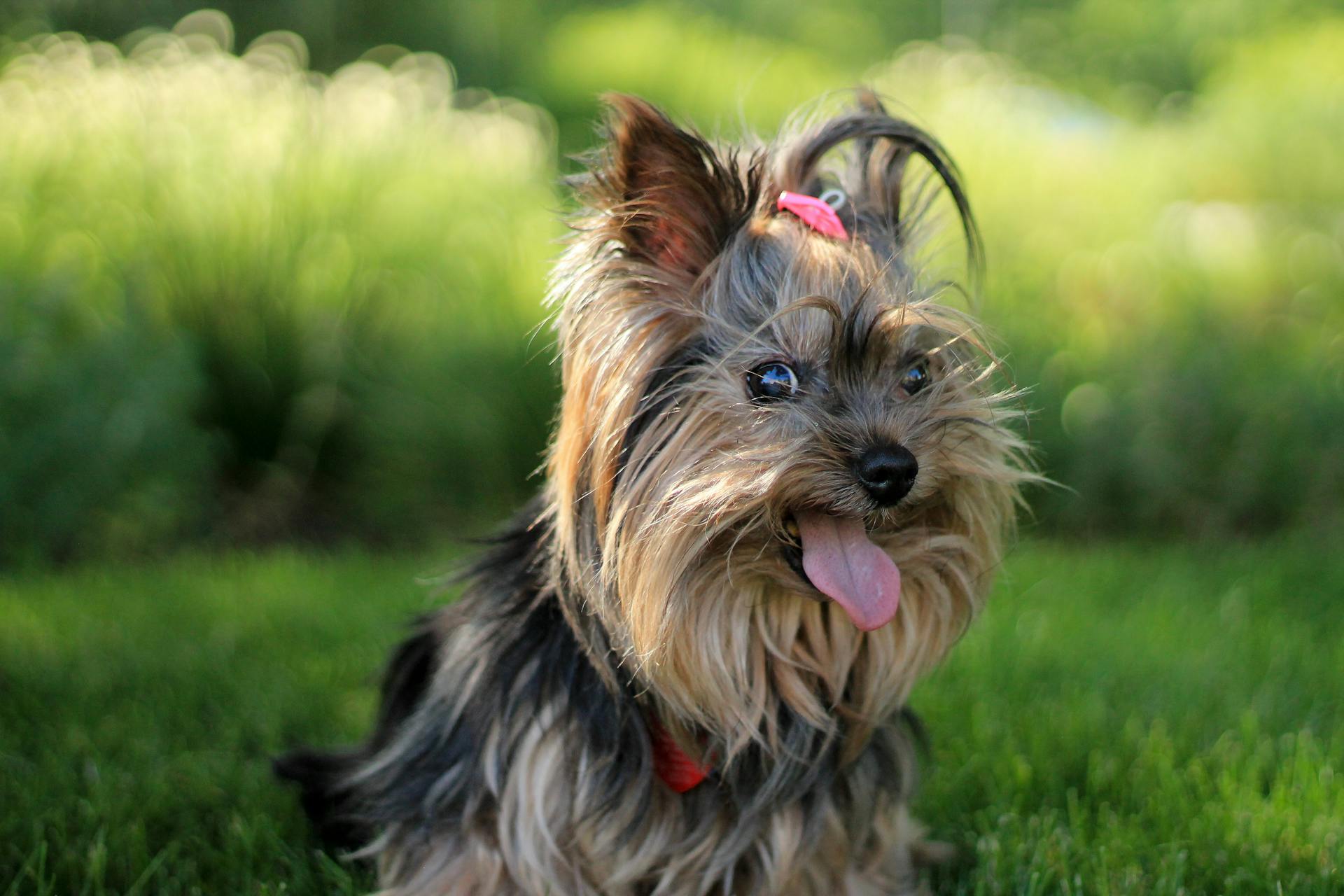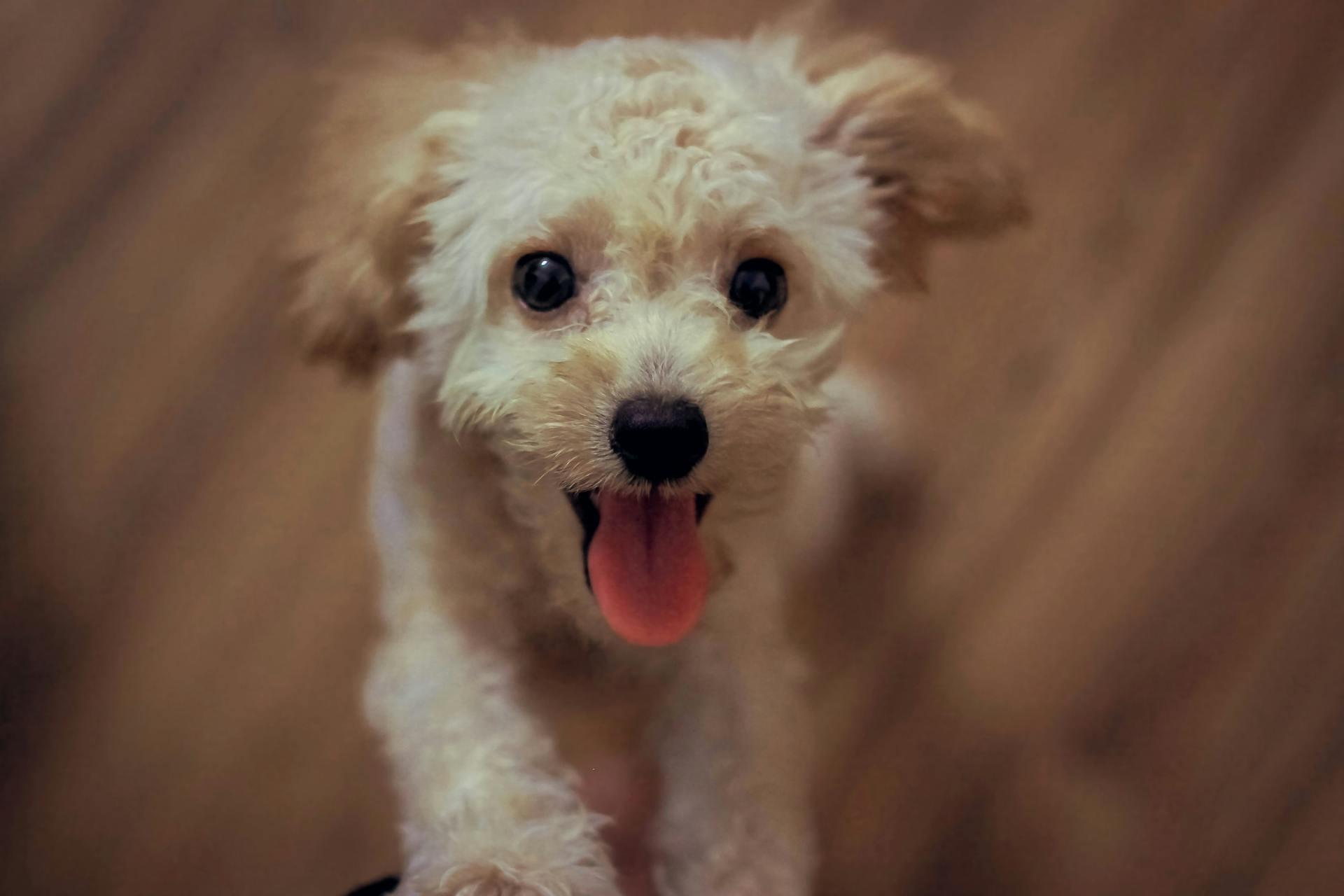
Owning a Yorkipoo can be a delightful experience, but it's essential to be aware of their unique characteristics and needs.
Yorkipoos are a cross between a Yorkshire Terrier and a Poodle, typically weighing between 4-7 pounds and standing 6-10 inches tall.
They require regular grooming to prevent matting and tangling of their fur, which can be time-consuming but rewarding.
Their small size makes them ideal for apartment living, but they still need daily exercise to stay happy and healthy.
Yorkipoos are intelligent and trainable, but they can be stubborn at times, so consistency and positive reinforcement are key.
With proper care and attention, Yorkipoos can thrive and become loving companions for many years.
Characteristics
Yorkipoos are one of the smallest dog breeds around, making them a great fit for city living or families with small spaces.
Their coat is open with a very wavy texture, which can be a bit high maintenance when it comes to grooming.
They come in a variety of different colors, including gray, apricot, black and tan, chocolate, black, sable, silver, red, and cream, making each one unique.
Yorkipoos can inherit a range of traits from their poodle parents, including their intelligence, which makes them highly trainable.
Related reading: Yorkipoo Black
Physical Appearance
Yorkipoos are one of the smallest and sweetest mixed breeds today, with a coat that's open with a very wavy texture and moderate shedding.
They come in a variety of colors, including gray, apricot, black and tan, chocolate, black, sable, silver, red, and cream, and can even be a combination of these colors.
Their ears may be pointy and V-shaped like a Yorkshire Terrier or floppy like a Poodle, with floppy ears making them prone to ear infections.
Yorkipoos usually have dark brown eyes and wet black noses.
Their size is generally small, with most Yorkipoos standing between 7 to 10 inches tall at the shoulder, and weighing between 4 to 15 pounds.
Their lightweight build and compact dimensions make them ideal companions for various living environments, including apartments and smaller homes.
A good breeder will be able to show you photos of the parent dogs and previous puppies to give you an idea of what your Yorkipoo will look like.
Their body shape may vary, with some having very skinny legs and a narrow frame while others are stockier.
Are Hypoallergenic?
Yorkipoos are a great choice for those with mild allergies, as they are hypoallergenic.
Their Poodle coat sheds almost no hair, making them a good option for people with allergies.
While the American Kennel Club doesn't recognize the Yorkshire Terrier as hypoallergenic, many owners report they are, as they also shed minimal hair.
No dog breed is 100% hypoallergenic, so people with severe allergies may still react to a Yorkipoo's presence.
The more Poodle a Yorkipoo has in its lineage, the less fur it will shed and the more hypoallergenic it will be.
Intriguing read: Yorkipoo Adult
Personality and Traits
The Yorkipoo's personality is a unique blend of its parent breeds, the Yorkshire Terrier and the Poodle. They are intelligent, lively, and fearless, making them a great companion for active families.
Their terrier heritage gives them a bold and confident nature, but they also have a gentle and loving side, making them a great lap dog. They thrive in human companionship and love to join in family activities.
Yorkipoos are known to be excellent companions through consistent and positive training, adapting well to various situations. They are also very trainable, enjoying learning new skills, games, and tricks.
Their small size means they can be easily injured by rough play or handling, so it's essential to handle them with care. They can also be prone to nipping if they feel threatened.
A well-bred Yorkipoo should be outgoing and confident, not nervous, shy, or aggressive. They make great pets for singles, couples, older people, or families with older children, as long as they are socialised from an early age.
Their tiny size also means they can get tired quickly, so they don't require a lot of exercise. However, they do need regular, even daily, brushing to prevent their coat from becoming matted and causing painful skin infections.
Health
Yorkipoos, like all breeds, can experience certain health conditions. Epilepsy is a neurological condition that can cause mild to severe seizures, characterized by unusual behavior, staggering, or even falling down.
It's essential to have awareness of these health conditions if you're considering bringing a Yorkipoo into your family. Reputable breeders should provide health clearances for both parents, which can be verified on the OFA website.
Yorkipoos are susceptible to patellar luxation, a common issue in small dogs that involves the dislocation of the kneecap. While it can be debilitating, many dogs lead normal lives with this condition.
Legg-Calve-Perthes Disease is a hip joint condition that can cause pain and discomfort. Surgery can offer pain relief, but it's crucial to catch it early to prevent long-term damage.
Hypothyroidism is a disorder of the thyroid gland that can manifest as epilepsy, hair loss, obesity, and skin issues. Treatment involves medication and dietary adjustments.
Yorkipoos can also suffer from hyperadrenocorticism (Addison's Disease), a serious condition that arises from insufficient adrenal hormone production. Timely diagnosis through tests is crucial.
Atopic Dermatitis is an inherited skin ailment that causes allergic reactions to common substances, resulting in itching, redness, and hair loss. Treatment includes allergen avoidance, antihistamines, and hypoallergenic shampoos.
Portosystemic Shunt (PSS) is an abnormal flow of blood between the liver and the body, which can lead to neurobehavioral abnormalities, lack of appetite, hypoglycemia, and other issues. Corrective surgery can be helpful in long-term management.
Here's a list of common health issues in Yorkipoos:
- Epilepsy
- Patellar Luxation
- Legg-Calve-Perthes Disease
- Hypothyroidism
- Hyperadrenocorticism (Addison's Disease)
- Atopic Dermatitis
- Portosystemic Shunt (PSS)
Regular veterinary check-ups and a healthy lifestyle can help prevent or manage these conditions.
Grooming
The Yorkipoo's coat is a delight to touch, ranging from straight to curly, and it's essential to brush it daily to prevent tangles and matting.
Regular brushing also helps maintain the coat's silky and vibrant state, and it's crucial to gently brush hair away from the eyes to prevent irritation.
Occasional trimming with scissors can safeguard eye health, and the beauty of a designer breed lies in your preference; there is no "correct" cut.
To maintain the coat's lustrous texture, periodic baths are necessary, but they should only be done when needed rather than on a fixed schedule.
Dental hygiene is crucial for toy breeds like the Yorkipoo, and brushing teeth two to three times a week can combat tartar buildup and potential gum disease.
Nail trimming should occur monthly to prevent discomfort and complications, and it's best to seek guidance from a professional if you're new to it.
Weekly ear checks are essential for signs of redness or unusual odor, indicating a potential infection.
Introducing grooming rituals to your Yorkipoo from an early age can help acclimate them to brushing, paw handling, and mouth inspection, and positive experiences with grooming can set the stage for seamless veterinary exams and handling in adulthood.
For more insights, see: Yorkiepoo Puppy
Exercise and Nutrition
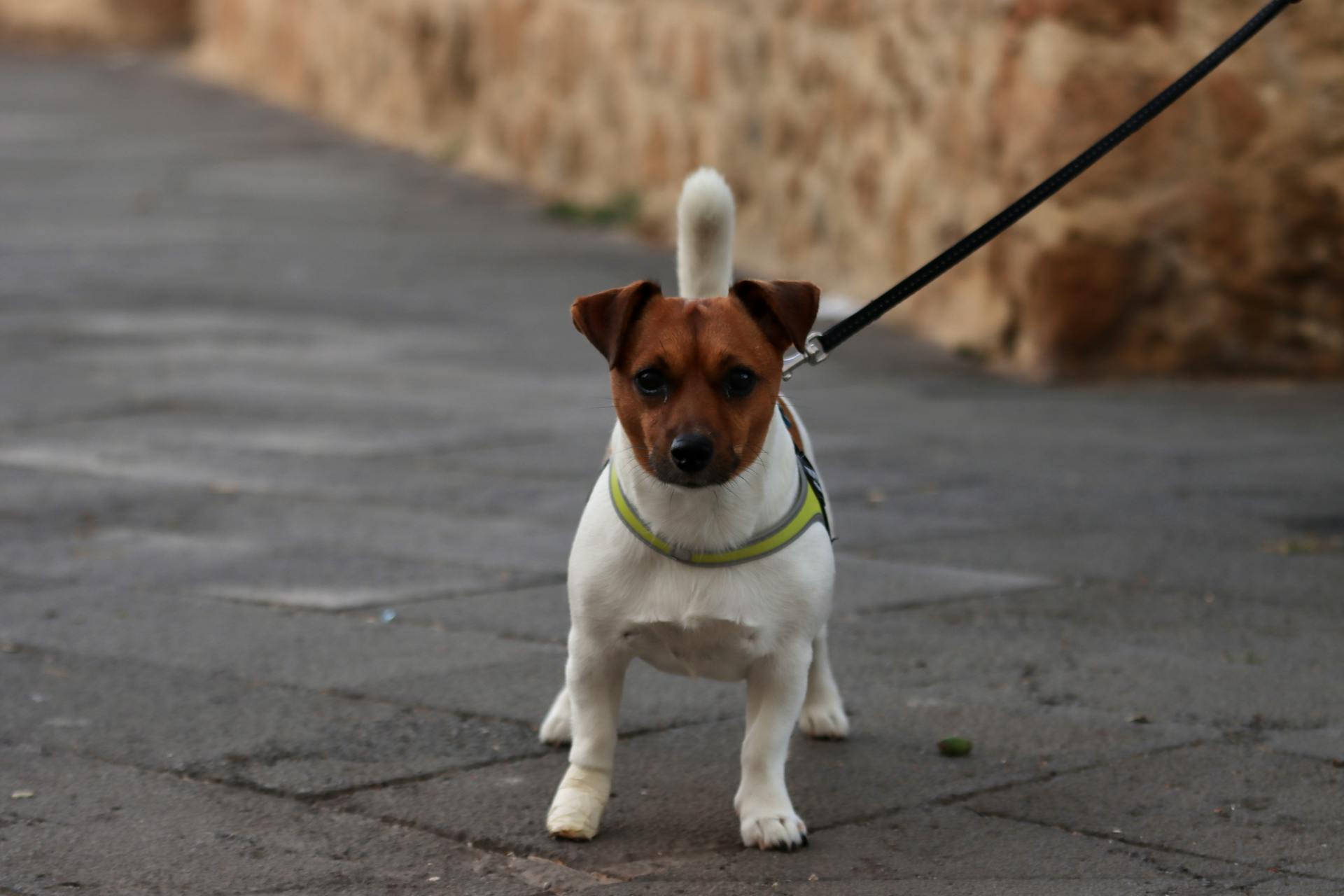
Exercise is essential for your Yorkipoo's happiness and health. They need half an hour to an hour's walking each day, plus plenty of games and owner interaction.
Without regular exercise, they can get bored, noisy, and possibly destructive. A bored Yorkipoo is a recipe for disaster, so make sure to include playtime in your daily routine.
Their fast metabolism means they need to eat little and often, making small-breed foods specifically designed for them a great choice. These foods have the right balance of key nutrients and smaller kibble sizes to suit smaller mouths.
Exercise Requirements
The Yorkipoo's exercise needs are relatively straightforward. They require daily exercise to stay happy and healthy.
A Yorkipoo's small size means they don't need as much exercise as larger dogs, but they still need some physical activity. They'll need between 20-60 minutes of exercise daily.
A quick walk around the block is usually enough to tire a Yorkipoo out, making them a great choice for senior citizens. They'll often have quick bursts of energy, run around like crazy then crash on their bed for a long nap.
Playing fetch with a small tennis ball or tug-of-war with their soft toys is a great way to provide your Yorkipoo with mental and physical stimulation. They'll love these activities and will be happy to have you engage with them.
Nutrition and Feeding
Fast metabolism is a characteristic of toy dog breeds, so they need to eat little and often to keep their energy levels up. This means feeding them small, frequent meals throughout the day.
Small-breed foods are specifically designed with smaller kibble sizes to suit smaller mouths, which encourages chewing and improves digestion. Your dog's diet needs to have the right balance of all the main nutrient groups.
A constant supply of fresh water is essential, so make sure your dog always has access to a clean water bowl. Regular body condition scores will help you ensure your dog is in ideal shape.
The precise amount of food your adult dog consumes depends on factors like size, age, metabolism, and activity level. This means that an active dog will require more nourishment than a sedentary one.
Maintaining your dog's health involves measuring his meals and feeding him twice a day, rather than keeping food available all the time. This will help you assess his weight and adjust his food intake as needed.
To check your dog's weight, look down at him and see if you can spot a slight waistline. You should also be able to feel his ribs without applying excessive pressure when placing your hands on his back.
Ownership and Family
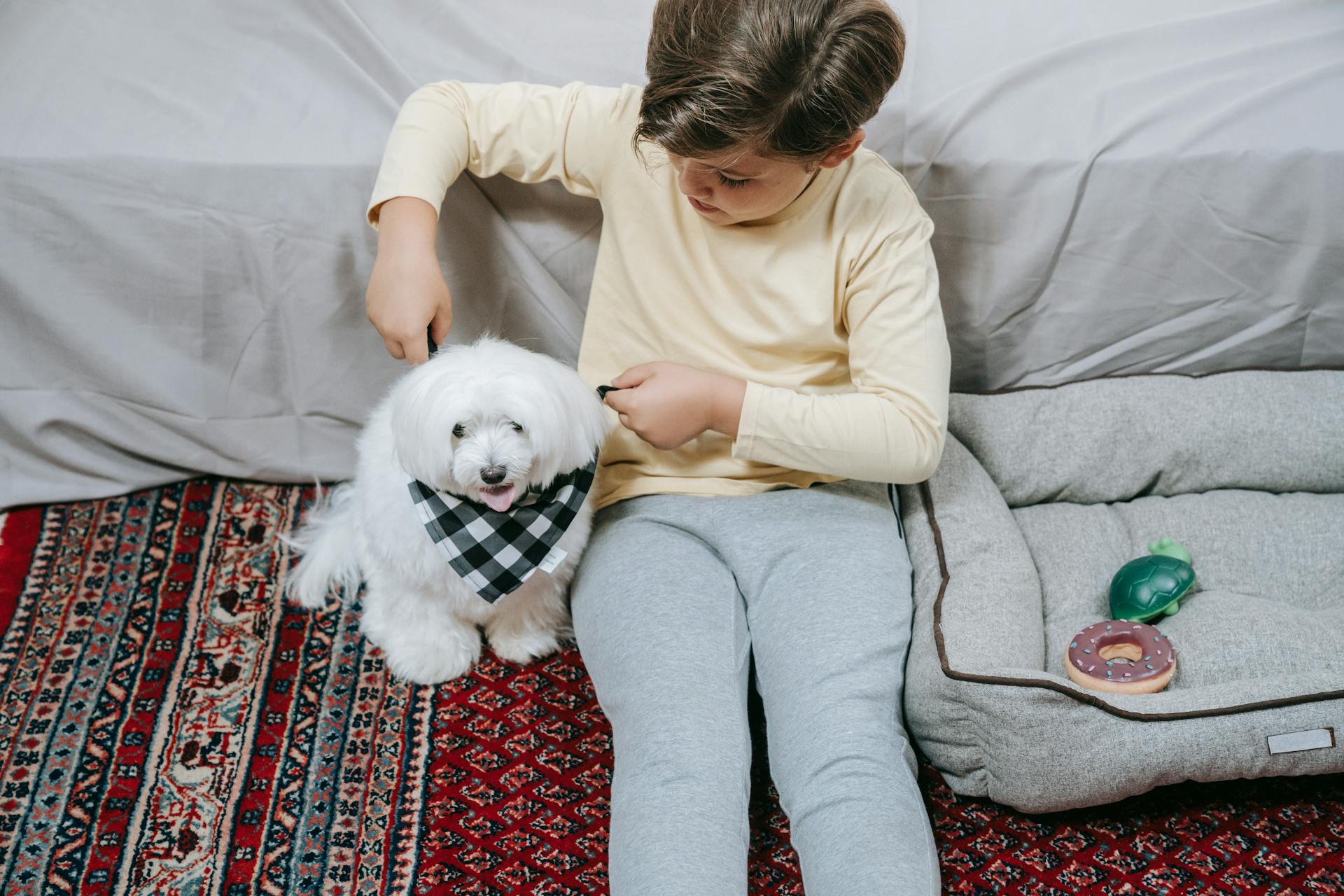
The Yorkipoo makes a great pet for the right owner, and that includes families with children. They're playful, fun, and affectionate, but they're not suitable for young children due to their small size and delicate nature.
Yorkipoos can be surprisingly game and feisty, but they're not high-maintenance in terms of exercise. They're happy with short play sessions and regular walks, making them a great choice for families with smaller living spaces.
They're social dogs and love to spend time with their human family, so they're perfect for families who want a companion dog. They'll happily play tug-of-war with their soft toys or cuddle up on the lounge with you.
However, Yorkipoos don't like to be left alone for long periods, so they need an owner who is either at home most of the time or can take them with them wherever they go. This can be a challenge for families with busy schedules, but it's worth it for the companionship and love they provide.
With proper socialization from an early age, Yorkipoos can get along well with other dogs and pets, even if they're smaller than usual. They're generally gentle and affectionate, making them a great addition to many families.
Buying and Caring for a Yorkipoo
Yorkipoos are fragile tiny dogs that require gentle handling, especially when they're puppies.
Buying a Yorkipoo puppy from an experienced and reputable breeder is essential to ensure you get a healthy dog. They will have done genetic testing on the parents to detect and prevent diseases.
You should avoid buying from an irresponsible or inexperienced source, like a backyard breeder or pet store, as they may not test the parent breeds for health issues.
Yorkipoos need daily exercise to stay happy and healthy, a short stroll or playtime in the yard will suffice.
Crate training is a valuable tool for Yorkipoos, it helps prevent accidents indoors and ensures their safety. However, it's crucial not to keep them crated for extended periods, as they thrive on human companionship.
Be careful when buying a Yorkipoo online, scam websites may advertise non-existent dogs and steal your money.
A good breeder will happily discuss the puppies with you, answer any concerns, and ask questions about you and your home. They may also ask to see the parent dogs.
Yorkipoos can be prone to health issues, so it's essential to take them to the vet soon after adoption and set up a preventive regimen to avoid many health issues.
Traits and Behavior
Yorkipoos are generally very tiny, weighing around 10 pounds, and have a slightly scruffy coat, although some may have a curly Poodle coat.
They are known to be bold and may chase small creatures, including rodents, squirrels, and even the neighbor's cat, due to their Yorkshire Terrier ancestry.
Their intelligence and trainability make obedience training easier, but they can be stubborn, so persistence is key.
Positive reinforcement is recommended when training a Yorkipoo, rewarding them with treats, praise, or a pat on the head when they do something right.
Avoid using negative reinforcement or punishment, as it can scare them and make them hide their bad behavior.
Yorkipoos hate to be left alone and are prone to developing separation anxiety, which can lead to excessive barking, destroying things, or chewing their feet.
It's essential to teach them that it's okay to be alone from an early age, starting with short periods of time in a room alone and gradually increasing the duration.
To prevent separation anxiety, give your Yorkipoo something to do when left alone, such as toys that slowly release food, like lick mats.
Yorkipoos are social animals and need continued socialization with other dogs and pets to learn how to play with them properly.
They can be a little standoffish with other dogs, especially if they're not socialized properly.
Their high prey drive means they may chase small pets or wildlife, so it's crucial to train them properly and ensure they don't run off while you're outside.
They need constant attention and can be quite demanding, but they can also settle well in an apartment setting.
Frequently Asked Questions
What is the difference between Yorkie and Yorkipoo?
A Yorkie is a purebred Yorkshire Terrier, while a Yorkiepoo is a hybrid breed, combining a Yorkshire Terrier with a Poodle, resulting in a unique size and characteristics. This mix creates a distinct difference between the two breeds, making the Yorkiepoo a popular choice for many dog owners.
How big does a Yorkie Poo get?
A Yorkie Poo typically grows to 7-15 inches tall and 5-15 pounds, with size varying depending on the parent breed. If your Yorkie Poo has a toy poodle parent, it's likely to be on the smaller side.
What is the lifespan of a Yorkie Poo?
Yorkie Poos typically live 12 to 15 years, with some remaining active and playful well into adulthood. This long lifespan makes them a wonderful companion for many families.
Featured Images: pexels.com
